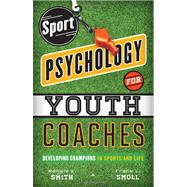
Note: Supplemental materials are not guaranteed with Rental or Used book purchases.
Purchase Benefits
What is included with this book?
| Developing a Coaching Philosophy | |
| Athletic Competition for Children and Adolescents: Why Youth Sports? | p. 3 |
| The Importance of Play | p. 3 |
| The Growth of Youth Sports | p. 4 |
| Youth Sport Values | p. 6 |
| Sport Models and Goals: Kids Are Not Professionals! | p. 11 |
| Developmental versus Professional Models of Sport | p. 12 |
| Objectives of Youth Sports | p. 14 |
| Keeping Sports in Perspective | p. 17 |
| Becoming a Better Coach | |
| Coaching Roles and Relationships: Influencing Young Athletes' Lives | p. 21 |
| Orientation to the Psychology of Coaching | p. 21 |
| Achievement in Sports and Life | p. 22 |
| Mastery Climate Research Results | p. 25 |
| A Healthy Philosophy of Winning | p. 27 |
| The Mastery Approach to Coaching: Applying Sport Psychology | p. 29 |
| Reactive Coaching Behaviors | p. 31 |
| Spontaneous/Self-Initiated Coaching Behaviors | p. 41 |
| Gaining Athletes' Respect | p. 45 |
| Summary of Coaching Guidelines | p. 45 |
| Communication and Self-Awareness: Skills for Improving Coaching Effectiveness | p. 49 |
| Communicating Effectively | p. 49 |
| Increasing Self-Awareness | p. 50 |
| Performance Enhancement Skills for Young Athletes | |
| Goal Setting: Charting the Road to Success | p. 55 |
| Why Goal Setting Works | p. 56 |
| How to Use Goal-Setting Procedures | p. 56 |
| Common Problems with Goal Setting | p. 61 |
| Setting Up Your Program | p. 62 |
| Athletic Stress: Teaching Coping Skills to Young Athletes | p. 65 |
| What Is Stress? | p. 65 |
| How Stress Affects Young Athletes | p. 67 |
| The Nature of Mental Toughness | p. 68 |
| Reducing Stress and Building Mental Toughness | p. 70 |
| Mental Rehearsal: Using the Mind to Program the Body | p. 85 |
| How Imagery Improves Performance | p. 87 |
| Introducing the Power of Imagery to Athletes | p. 88 |
| Incorporating Imagery Training into Your Practices | p. 89 |
| Mental Preparation for Competition | p. 91 |
| Coaching Challenges and How to Deal with Them | |
| Working Effectively with "Problem Athletes": Turning Problems into Opportunities | p. 95 |
| The Uncoachable Athlete | p. 96 |
| The Self-Centered Spoiled Brat | p. 98 |
| The Low-Self-Esteem Athlete | p. 100 |
| The Hyperanxious Athlete | p. 101 |
| The Withdrawn-Suspicious Athlete | p. 102 |
| Coach-Parent Relationships: A Vital Link in Successful Youth Sport Experiences | p. 105 |
| Parent Obligations and Commitments | p. 105 |
| Parent Behavior at Sport Events | p. 110 |
| Promoting Two-Way Communication | p. 111 |
| Dealing with "Problem Parents" | p. 113 |
| Conducting a Coach-Parent Meeting | p. 116 |
| What to Do If… | p. 125 |
| Should Kids Ever Be Cut? | p. 125 |
| What If an Athlete Wants to Quit? | p. 126 |
| Unusual Disciplinary Problems | p. 127 |
| When Injury Prevents Participation | p. 128 |
| Dealing with a Tough Loss or Losing Streak | p. 129 |
| Dealing with a Winning Streak | p. 130 |
| Trophies and Other Awards | p. 131 |
| Misbehavior by Other Coaches | p. 131 |
| Can You Be Sued? | p. 132 |
| Coaching Your Own Child | p. 139 |
| Coaching and Family Life | p. 140 |
| Final Words | p. 143 |
| Bibliography | p. 145 |
| General Resources | p. 145 |
| Research Articles Related to the Mastery Approach to Coaching | p. 147 |
| Index | p. 151 |
| About the Authors | p. 155 |
| Table of Contents provided by Ingram. All Rights Reserved. |
The New copy of this book will include any supplemental materials advertised. Please check the title of the book to determine if it should include any access cards, study guides, lab manuals, CDs, etc.
The Used, Rental and eBook copies of this book are not guaranteed to include any supplemental materials. Typically, only the book itself is included. This is true even if the title states it includes any access cards, study guides, lab manuals, CDs, etc.